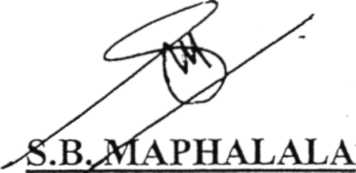IN THE HIGH COURT OF SWAZILAND THEMBA TSELA Applicant And SWAZILAND ELECTRICITY BOARD 1st Respondent MINISTER OF NATURAL RESOURCES & ENERGY 2nd Respondent THE ATTORNEY GENERAL 3 rd Respondent MR M. J. MANZENI 4th Respondent JOSEPH RYAN MOTHTBI 5° Respondent Civil Case No. 934/2005 S3.MAPHALALA-J MR. S. MDLADLA .ADVOCATE Z.F. JOURBERT S.C. (Instructed by Currie & Sibandze) cram or the Applicant or the Respondents
JUDGMENT 23 rd February 2007 [IT On the 15 March 2005 the Applicant filed an application in the long form before this court on the following grounds: That the ruling/award made by the 4th Respondent on the 5th November 2004 in his capacity as Chairman, duly appointed as such by the 1st Respondent, of the disciplinary enquiry instituted by the 1st Respondent against the Applicant on the 21st, 22nd and 25th of October 2004 be reviewed and set aside. The 1st Respondent be ordered within seven days of granting of this order to request from the 5th Respondent his ruling/award with regard to the disciplinary enquiry instituted by the 1st Respondent against the Applicant, commencing on die 20th April 2004 and concluded on the 27th of July 2004, such ruling/award to be delivered to the Applicant within 21 days of receipt of request by the 1st Respondent to the 5* Respondent to finalize same. [21 When the matter came for arguments before me Mr. Mdladla who appeared for the Applicant informed the court that the Applicant concedes ±21 he cannot proceed in prayer 1 thereof as this aspect of the matter should be brought before the Industrial Court and he persistent however that this court can hear prayer 2 thereof. Advocate Jourbert for the Respondents argued on the other hand that even prayer 2 falls to be decided as prayer 1 by the Industrial Court. In this regard the Respondents relied on a recent judgment of the Supreme Court of Swaziland in the matter of Swaziland Breweries Limited vs Constantine Ginindza - Civil Appeal No. 33 of 2006.
In this case the learned Judge of Appeal stated the following at page 12 of the judgment. In the context of the legislature Scheme and object of the Act as fully set out above I am satisfied that the intention of the Legislature was to confer exclusive original jurisdiction on the Industrial Court in matters provided for under the Act. Put differently, all such matters must first go to the Industrial Court. It is only after the latter Court has made a decision or order in the matter that an aggrieved party may approach the High Court for review on common law grounds. It follows that by launching his review application in the High Court before the Industrial Court had made a decision or order in the matter, the Respondent chose the wrong forum. [3] It is contended on behalf of the Applicant that the first prayer has been overtaken by events in view of the above dictum of the Supreme Court. The second prayer remains to be determined as it evidently hinges upon the constitutional rights of the Applicant, in particular, the right to administrative justice. Section 33 (1) of the Constitution of the Kingdom of Swaziland Act No. 73 of 2005 reads ua person appearing before any administrative authority has a right to be heard and to be treated justly and fairly in accordance with the requirements imposed by law including the requirements of fundamental justice or fairness". [4] The Applicant further contends thai Section 33 (2) of the Constitution applies. The said Section provides thai ~a person appearing before any administrative authority has a right to be given reasons in writing for the decision of the authority". The Constitution further gives an individual who is aggrieved the right to take the matter to court.
[5] On the other hand the Respondent has advanced arguments per contra and these arguments are clearly outlined in the Heads of Arguments filed by the learned advocate. The crux of the Respondents case is that the Applicant is not entitled to bring such an application before this court in that Section 8 (1) of the Industrial Relations Act affords exclusive jurisdiction in matters arising between employer and employee in the course of employment to the Industrial Court of Swaziland. In this regard the court was referred to many decided cases in South Africa including the case of Johannesburg Consolidated Investments Co. vs Johannesburg Town Council 1903 T.S. 111. [6] In my assessment of the affidavits filed of record and the arguments advanced by Counsel in this case I have come to the considered view That the position adopted by the Respondent is the correct one in the circumstances. I say so and in this respect I am in agreement with ihe Respondent that a reading of the Applicant's papers conveys the dear impression that he has approached this review on the basis that it is an appeal rather than a review. [7] The Applicant is not entitled to bring such an application before this court in thai Section 8 (1) of the Industrial Relations Act affords exclusive jurisdiction in matters arising between employer and employee in the course of employment to the Industrial Court of Swaziland, (see the case of Swaziland Breweries Ltd and another (supra). [8] It appears to me further that there may be factual disputes as to what transpired between the Applicant and the 1st Respondent's attorneys.
[9] In the result, for the afore-going reasons, the application is dismissed with costs, including the costs of Senior Counsel. JUDGE
